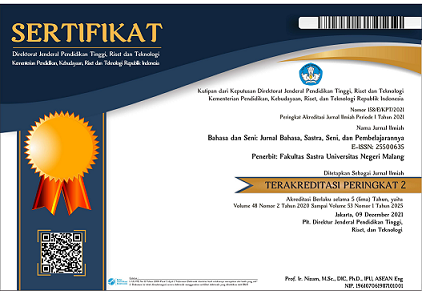COPING WITH L2 SOCIOPRAGMATIC SENSITIVITY USING A STORY-BASED APPROACH
Abstract
Abstract: Previous research findings have led to a gap that sociopragmatic failure, instead of pragmalinguistic failure, has scarcely been resolved despite its crucial function in communication. Therefore, this paper proposes a story-based approach, particularly a joint storytelling with multi-party interaction, to deal with learners’ L2 sociopragmatic sensitivity. EFL learners with diverse cultural backgrounds need a motivating environment with agents that can co-construct experiences for optimum learning. By telling stories, learners are engaged in social relations that set them into interpersonal interaction demanding sociopragmatic awareness necessary for the development of their L2 sociopragmatic competence. For this purpose, classroom implementation follows the dimensions of embeddedness, tellership, and tellability while the learning sequence is based on co-constructed learning principles with four stages: setting the stage, executing the storytelling, monitoring the process, and evaluating the results. Future research may be conducted to test the compatibility of the model with actual EFL classroom instructions.
permalink/DOI: dx.doi.org/10.17977/um015v45i22017p108
Full Text:
PDFReferences
Ariani, M. & Widiati, U. (2017). Multicultural education and pragmatics instruction in EFL classrooms to win learners’ right to learn. Revisiting English Teaching, Literature, and Translation in the Borderless World: My world, Your World, Whose World. The 10th International Conference Proceeding. ISBN 978-602- 1047-68- 2. March 18, pp 154-162
Bachman, L. (1990). Fundamental Consideration in Language Testing Oxford University Press, Oxford.
Bella, S. (2011). Mitigation and Politeness in Greek Invitation Refusals: Effects of Length of Residence in the Target Community and Intensity of Interaction on Non-native Speakers' Performance. Journal of Pragmatics. 43. 1718-1740.
Campilo, PS. 2007. Examining mitigation in requests: A focus on transcripts in ELT coursebooks. In Soler, EA, & Jorda MPS (eds). Intercultural Language Use and Language Learning, pp 207-222
Canale, M. (1983). From communicative competence to communicative language pedagogy. In: Richards, JC, Schmidt, R (eds). Language and Communication. Longman, New York, pp 2-27
Celce-Murcia, M. C. (2007). Rethinking the role of communicative competence in language teaching. In E. A. Soler, & M. P. Jorda (Eds.), Intercultural Language Use and language Learning. Dordrecht, The Netherlands: Springer.
Celce-Murcia, M, Dornyei Z, Thurrel S. (1995). Communicative competence: A pedagogically motivated model with content specifications. Issues in Applied Linguistics. 6: 5-35
Cohen, A. D., & Shively, R. L. (2007). Acquisition of requests and apologies in Spanish and French: Impact of study abroad and strategy-building intervention. Modern Language Journal, 91(2), 189–212. https://doi.org/10.1111/j.1540-4781.2007.00540.x
Georgakopoulou, A. (2007). Small Stories, Interaction, and Identities. Benjamins
Holmes, J., & Riddiford, N. (2011). From classroom to workplace: Tracking socio-pragmatic development. ELT Journal, 65(4), 376–386. https://doi.org/10.1093/elt/ccq071
Ishihara, N., & Cohen, A. D. (2010). Teaching and Learning Pragmatics: Where Language and Culture Meet. Pearson Education Limited.
Ishihara, N. (2013). Is it rude language? Children learning pragmatics through visual narratives. TESL Canada Journal , 30 (7), 135-149.
Ishihara, N. (2017). Teaching pragmatics in support of learner subjectivity and global communication needs: A peace linguistics perspective. Official Journal of the National Association of Teacher Trainers and Supervisors – ANFIS, Italy.
Iwasaki, N. (2011). Learning L2 Japanese “politeness” and “impoliteness”: Young American men’s dilemmas during study abroad, 45(2011), 67–106. Retrieved from http://eprints.soas.ac.uk/11678/
Kim, Y., & Taguchi, N. (2016). Learner-Learner Interaction During Collaborative Pragmatic Tasks: The Role of Cognitive and Pragmatic Task Demands. Foreign Language Annals, 49(1), 42–57. https://doi.org/10.1111/flan.12180
Lee, H. 2015. Telling stories and making social relations: transnational women’s ways of belonging in intercultural contexts. Applied Linguistics. 36/2:174-193
McConachy, T. & Hata, K. (2013). Addressing texbooks representations of pragmatics and culture. ELT Journal. 67/3: 294-301
Nguyen, H. T. (2012). social interaction and competence development: learning the structural organization of a communicative practice. Learning, Culture, and Social Interaction. 1, 127-142. https://doi.org/10.1016/jJcsi.2012.05.006
Nieto, S. (2010). Language, Culture, and Teaching: Critical Perspectives for a New Century (2nd ed.). New York: Taylor & Francis.
Ochs, E. & Capps, L. 1996. Narrating the self. Annual Review of Anthropology. 25:19-43
Ochs, E. & Capps. L. 2001. Living Narratives. Harvard University Press.
Ochs, E. & Shohet, M. 2006. The cultural structuring of mealtime socialization. New Directions for Child and Adolescent Development. 111, 35-49
Taguchi, N. (2014). Pragmatic Socialization in an English-medium University in Japan. International Journal of Applied Linguistics in Language Teaching - IRAL , 52 (2), 157-181.
Thomas, J. (1983). Cross-cultural Pragmatic Failure. Applied Linguistics , 4, 91-112.
Refbacks
- There are currently no refbacks.

This work is licensed under a Creative Commons Attribution 4.0 International License.

Dear Sir/Madam
We appreciate your continued confidence and trust in Bahasa dan Seni: Jurnal Bahasa, Sastra, Seni, dan Pengajarannya (JBS). In order to enhance the service, readability, and quality of JBS publications, we will be transitioning to a new website, https://citeus.um.ac.id/jbs, in collaboration with Digital Commons (Elsevier) starting in July 2024.
Sincerely
Yusuf Hanafi
(Editor in chief)















2.png)